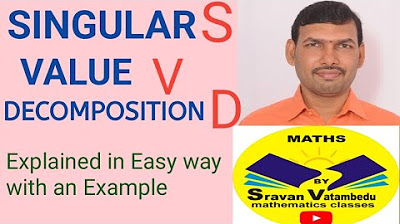Why Does the United States Use the Electoral College and Not a Popular Vote to Decide the President
Summary
TLDRThe video delves into the complexities of the U.S. Electoral College system, outlining its historical context, mechanics, and the implications of potential electoral ties. It explains how electors are chosen, the impact of faithless electors, and the role of the House of Representatives in the event of no majority. The narrative highlights significant moments in U.S. history, including the controversial 1824 election and the reforms following the 1800 election. The video also addresses current discussions around potential reforms to the Electoral College, making the case for its relevance in today's political landscape.
Takeaways
- 😀 Al Gore conceded the 2000 presidential election to George W. Bush after a contentious recount in Florida, decided by a narrow margin of 537 votes.
- 😀 The United States uses the Electoral College system, where voters actually cast ballots for electors pledged to candidates, not directly for the candidates themselves.
- 😀 The president is officially elected when electoral votes are counted in Congress on January 6, following the election.
- 😀 Electors are chosen by state political parties, and each state’s number of electors is equal to its total congressional representation.
- 😀 The Electoral College allows for electors to vote against the popular vote in their states, though most adhere to it; laws vary by state regarding this.
- 😀 The system was established as a compromise during the Constitutional Convention of 1787, reflecting concerns about direct democracy and regional interests.
- 😀 Historical issues, such as the Three-Fifths Compromise, have influenced electoral outcomes, particularly in the 1824 election with Andrew Jackson and John Quincy Adams.
- 😀 If no candidate receives a majority of electoral votes, the election is decided by the House of Representatives, where each state has one vote.
- 😀 The 12th Amendment, passed after the election of 1800, established separate votes for president and vice president to avoid ties.
- 😀 Alternative proposals for reforming the Electoral College exist, including the National Popular Vote initiative, which would ensure that electors follow the national popular vote.
Q & A
What was the outcome of the 2000 presidential election between Al Gore and George W. Bush?
-Al Gore conceded the election to George W. Bush after a controversial Supreme Court decision halted a manual vote recount in Florida, where Bush won by just 537 votes.
Why does the United States use the Electoral College instead of a direct popular vote?
-The Electoral College was established as a compromise to balance the influence of populous states with smaller states and to ensure that the president was chosen by electors who were expected to be more informed than the general public.
How are electors chosen in the Electoral College?
-Electors are typically nominated by political parties in each state, and the number of electors per state corresponds to the total number of Senators and Representatives that state has in Congress.
What happens if no presidential candidate receives a majority of the electoral votes?
-If no candidate gets a majority, the election is decided by the House of Representatives, where each state delegation casts one vote.
Can electors vote contrary to the popular vote in their state?
-Yes, while 29 states and the District of Columbia have laws requiring electors to vote according to the state's popular vote, 21 states do not have such laws, allowing electors to vote as they choose.
What was the significance of the 12th Amendment?
-The 12th Amendment, passed in response to the election of 1800, established separate ballots for the president and vice president to prevent ties and clarify the election process.
How did the Three-Fifths Compromise affect the Electoral College?
-The Three-Fifths Compromise allowed slave states to count a portion of their slave population for determining electoral votes, which disproportionately increased the influence of those states in presidential elections.
What does it mean for an elector to be 'faithless'?
-A faithless elector is one who does not cast their vote in accordance with the popular vote of their state. Historically, this has occurred rarely, and no faithless elector's vote has ever determined an election.
What alternative method for electing the president has been proposed as a workaround to change the Electoral College system?
-The National Popular Vote Interstate Compact allows states to pledge their electoral votes to the candidate who wins the national popular vote, regardless of their own state's results, without needing a constitutional amendment.
What could happen if the House of Representatives and the Senate elect different party candidates for president and vice president?
-If the House elects a president from one party and the Senate elects a vice president from another party, it could lead to a divided administration, which complicates governance.
Outlines

هذا القسم متوفر فقط للمشتركين. يرجى الترقية للوصول إلى هذه الميزة.
قم بالترقية الآنMindmap

هذا القسم متوفر فقط للمشتركين. يرجى الترقية للوصول إلى هذه الميزة.
قم بالترقية الآنKeywords

هذا القسم متوفر فقط للمشتركين. يرجى الترقية للوصول إلى هذه الميزة.
قم بالترقية الآنHighlights

هذا القسم متوفر فقط للمشتركين. يرجى الترقية للوصول إلى هذه الميزة.
قم بالترقية الآنTranscripts

هذا القسم متوفر فقط للمشتركين. يرجى الترقية للوصول إلى هذه الميزة.
قم بالترقية الآنتصفح المزيد من مقاطع الفيديو ذات الصلة

The Hate U Give Chapter 1 - Read by Ms. Nisa

The Hate U Give Chapter 4 - Read by Ms. Nisa

Vowel Sounds

SINGULAR VALUE DECOMPOSITION (SVD)@VATAMBEDUSRAVANKUMAR

Singular Value Decomposition (SVD): Mathematical Overview

Erick tohir Serius Minta Re match😱Penyebab Shayne Pattynama Tranding🔴STY Siapkan Tim jawab Vietnam

Which Marketing Attribution Model Should I Use?
5.0 / 5 (0 votes)
